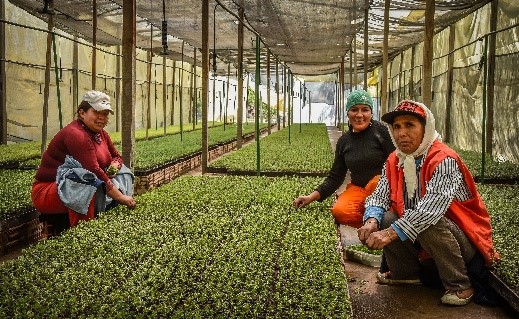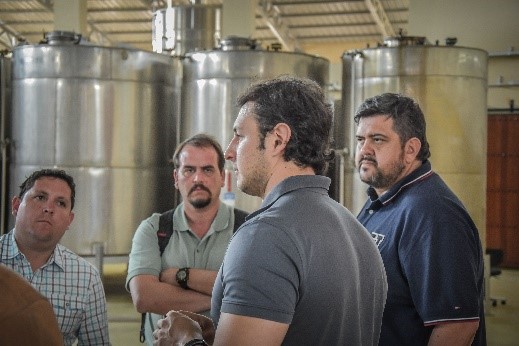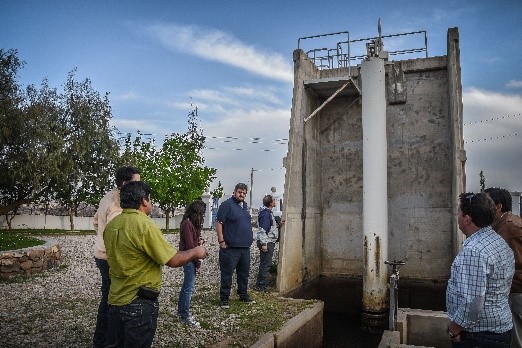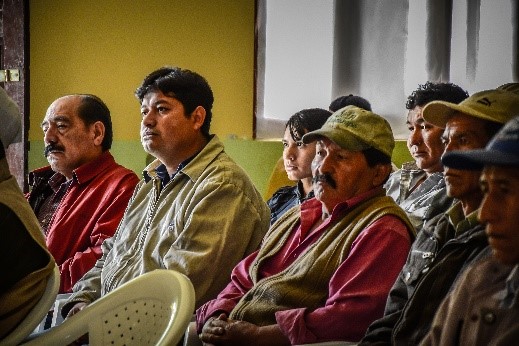 Capacity Building for Sustainable Management of Water and Energy Resources in the Wine Sector
Triangular Cooperation Initiative Between Argentina, Bolivia and Germany towards more sustainable wine production
Capacity Building for Sustainable Management of Water and Energy Resources in the Wine Sector
Triangular Cooperation Initiative Between Argentina, Bolivia and Germany towards more sustainable wine production

Challenges
The Province of Tarija in Bolivia is an area of high agricultural productivity and, therefore, of great importance for the country's economic development. The wine sector represents a vital economic activity in the region. At the same time, Tarija is also known for its inefficient water management, and is one of the most vulnerable provinces in Bolivia when it comes to the effects of climate change. According to climate projections, Tarija will experience considerable temperature fluctuations and desertification rates, which will have negative impacts on its agriculture. These factors make efficient water management an essential objective for the Province.
On the other hand, the Argentinian Province of Mendoza has built a lot of expertise in irrigation and efficient use of water resources in agriculture over the years, and is internationally recognised for its viticulture. In addition, in recent years the private wine sector of the geographical area has successfully implemented a sustainable wine production.
Towards a Solution
The objective of this triangular cooperation (TrC) initiative between Argentina, Bolivia and Germany is to improve water and energy management in Tarija' wine sector, and to optimise the availability of these resources in the Province. Introducing new irrigation techniques will improve the wine production of small local winegrowers. This will increase their income and thereby contribute to enhance their quality of life.
The General Department of Irrigation (DGI) of Mendoza has more than 120 years of experience in water management in the wine industry. Within the framework of this TrC, the DGI advises the Provincial Government of Tarija in the elaboration of a technical strategy for efficient water management in the wine sector. In addition, the DGI offers trainings to small local winegrowers on efficient use of water and its distribution for agricultural use.
The private sector is also involved in this initiative. Santa Rita Estates winery is one of the leading companies regarding efficient water resource management and sustainable wine production in the border region between Argentina and Chile. In order to expand the sustainable competences, Santa Rita Estates advises wineries of the National Wine Industry Association (ANIV) in the elaboration of technical guidance and provides trainings on efficient water use in wineries and vineyards to Bolivian winemakers.
On the German side, the Federal Ministry for Economic Cooperation and Development (BMZ) is supporting the initiative. Germany is internationally recognised for its efficient management of water and energy resources and for the development of related technologies. In this context, representatives of the project´s partner institutions visited conferences, expos and German wineries to exchange experiences with developers of latest technologies with low environmental impacts, in order to optimise the use of water and energy resources in their own wineries. More than 100 winegrowers have been trained in the efficient use of water resources. Likewise, 20 small and large Bolivian winemakers were provided with technical know-how on the optimisation of water distribution and administration.
On an institutional development level, this TrC initiative has contributed to the establishment of the Office for Integral Water Management (SEDEGIA) in Tarija, based on the Argentine example of the DGI. This office is in charge of the Province's water resource administration. With the support of the DGI, an innovative real time-telemetry application was set up to facilitate the water flow measurement at the San Jacinto dam, giving users a better control. The MIDO (Model of Operative Distribution Indicators) software, developed by Argentina, serves for the analysis of information sent by sensors to measure water flow. The measurement of flow through digital means of telemetry helps in the transparency of water management of the dam, decreases conflicts over water use and helps in the hydric watershed planning. This application will also be managed by SEDEGIA and technicians of the Provincial Government of Tarija who participated in trainings on institutional water resource management.
Beyond that, based on the knowledge imparted by the Argentinian partners, a viticulture strategy plan 2040 for an efficient water management has been elaborated for the stakeholders of the Bolivian wine sector (public and private institutions as well as the civil society). Also, a code of sustainability in wine production incorporating social and environmental aspects for ANIV’s wineries has been developed.
This triangular cooperation initiative is classified as successful and has been extended for 2 years, by incorporating new actors in Argentina and Bolivia, focusing on the following results:
- Public and private actors of the Tarija wine complex have started the implementation of the Strategic Plan for the Wine Industry (PEVI) of Tarija to 2040.
- The Provincial Government of Tarija has improved its capacities for the administration and control of the water distribution for irrigation of the San Jacinto dam.
- Bolivian wineries have implemented a code of sustainability in wine production.
Contact Information
Countries involved
Supported by
Implementing Entities
Project Status
Project Period
URL of the practice
Primary SDG
Primary SDG Targets
Secondary SDGs
Secondary SDG Targets
Similar Solutions
| NAME OF SOLUTION | Countries | SDG | Project Status | |
|---|---|---|---|---|
Addressing the Philippine Dairy Sector Challenges Exchanging knowledge between Argentina and the Philippines to improve Philippine local dairy production |
Argentina, Bolivia (Plurinational State of), Germany | 08 - Decent Work and Economic Growth 17 - Partnerships for the Goals | Ongoing | View Details |
ADELANTE Triangular Cooperation European Union – Latin America and the Caribbean |
Argentina, Bolivia (Plurinational State of), Germany | 10 - Reduced Inequalities | Ongoing | View Details |
Afghanistan-Indonesia-Germany Triangular Cooperation for Women’s Economic Empowerment Sharing good practices of women engaged in the home industry sector |
Argentina, Bolivia (Plurinational State of), Germany | 17 - Partnerships for the Goals | Completed | View Details |
African School of Humanitarian Forensic Action Improving the forensic capacities of African countries |
Argentina, Bolivia (Plurinational State of), Germany | 17 - Partnerships for the Goals | Completed | View Details |
Bamboo Development Initiative Supports Green Economy in Pacific Island Countries Establishing a Bamboo Centre in Fiji to serve as a focal point for bamboo-related activities and to revive the bamboo industry in the Pacific |
Argentina, Bolivia (Plurinational State of), Germany | 01 - No Poverty 02 - Zero Hunger 04 - Quality Education 05 - Gender Equality 07 - Affordable and Clean Energy 08 - Decent Work and Economic Growth 09 - Industry, Innovation and Infrastructure 11 - Sustainable Cities and Communities 12 - Responsible Consumption and Production 15 - Life on Land 17 - Partnerships for the Goals | Ongoing | View Details |



